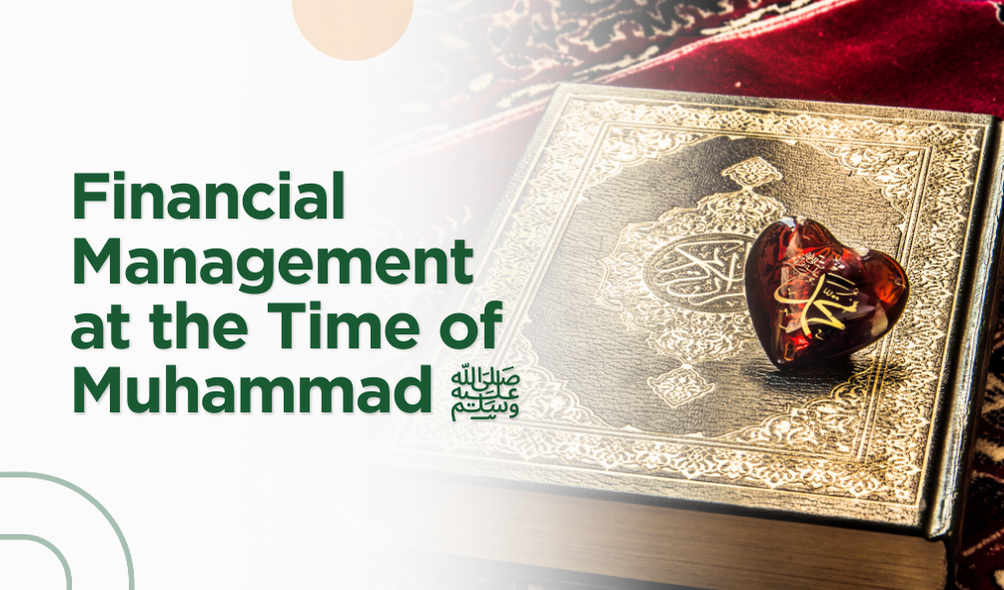Financial Management at the Time of Muhammad ﷺ
Financial management during the time of Prophet Muhammad ﷺ was a cornerstone in the establishment and stability of the Islamic society. The Prophet Muhammad ﷺ was not only a spiritual leader but also acted as the head of state, overseeing all aspects of life, including economic and financial affairs. His approach to managing the state’s finances was innovative and grounded in principles of social justice, equity, and optimal resource utilization for the benefit of all.
1. Introduction: Historical Context and Economic Challenges
Before the advent of Islam, Arabian society was characterized by significant social and economic disparities. Wealth was concentrated in the hands of a few powerful tribes, while the majority of the population lived in poverty. The economic system was marred by practices like usury (riba), which exacerbated social inequality and economic instability. The arrival of Islam brought a revolutionary change, introducing a new economic order based on justice, fairness, and collective well-being. This transformation was crucial for addressing the deep-rooted inequities of pre-Islamic society and laying the foundation for a more just and equitable social order.
2. Sources of State Revenue: Foundations of Islamic Fiscal Policy
During the Prophet’s time, the Islamic state derived its revenue from several key sources designed to support the collective welfare of society. These sources were not only financial mechanisms but also instruments of social justice and community support.
- Zakat: A Pillar of Social Justice: Zakat, one of the Five Pillars of Islam, was a compulsory form of almsgiving that ensured wealth was redistributed from the affluent to those in need. The state meticulously collected and managed zakat, ensuring it was distributed to the poor, orphans, debtors, and other eligible recipients. Zakat was not merely a charitable contribution but a mandatory duty that served as a critical financial mechanism for reducing poverty and inequality.
- Ghanimah and Fay’: Wealth from Conflict and Peace: Ghanimah, or spoils of war, was another significant source of state revenue. The Prophet implemented strict guidelines for the distribution of these spoils, ensuring that participants in battle received their due share while allocating a portion to the state treasury (Baitul Mal) for broader societal needs. Fay’, wealth acquired without combat, was also managed similarly, with a focus on public welfare.
- Jizyah: A Tax of Protection and Integration: Jizyah was a tax levied on non-Muslims living under Islamic rule. In return, they were granted protection and the same rights as Muslims, except for military service. This tax was a means of integrating non-Muslims into the Islamic state, ensuring their rights and contributions to society while also providing a steady revenue stream for the state.
- Kharaj: Land Tax for Agricultural Revenue: Kharaj was a tax on agricultural land, particularly land owned by non-Muslims. It played a vital role in the economic structure of the Islamic state, ensuring that agricultural wealth contributed to the state’s finances, supporting infrastructure and public services.
3. Wealth Distribution: Ensuring Social Equity and Stability
The distribution of wealth during the Prophet’s time was carefully managed to ensure fairness and social stability. The state’s financial resources were used to meet the basic needs of the population and to promote the welfare of the community as a whole.
- Baitul Mal: The Central Treasury of Justice: The Baitul Mal, or state treasury, was central to the management of public funds. The Prophet Muhammad ﷺ directly oversaw its operations, ensuring transparency, accountability, and the equitable distribution of wealth. Funds were allocated for social welfare, public works, and the support of the needy, reflecting the Islamic commitment to social justice.
- Utilization of Funds for Public Welfare: The state prioritized the use of funds from Baitul Mal for public welfare projects, such as building infrastructure, supporting education and healthcare, and ensuring that no one was left in poverty. This approach helped create a stable and prosperous society where wealth was not hoarded by a few but circulated for the benefit of all.
4. Principles of Financial Management: Islamic Economic Ethics
The financial management system implemented by Prophet Muhammad ﷺ was based on Islamic principles that emphasized justice, sustainability, and the welfare of the entire community. These principles laid the groundwork for what would later evolve into the broader framework of Islamic economics.
- Social Justice and Economic Equity: One of the Prophet’s key financial management principles was ensuring social justice and economic equity. Wealth was distributed in a manner that prevented the accumulation of wealth by a few at the expense of many. This was achieved through the institutionalization of zakat and other redistributive measures that ensured everyone received their fair share.
- Sustainable Resource Management: The Prophet emphasized the importance of managing resources sustainably, ensuring that financial policies and practices did not only address immediate needs but also considered the long-term welfare of the community. This principle of sustainability is evident in the careful management of public funds and resources, ensuring that they benefited future generations as well.
- Transparency and Accountability: All financial dealings were conducted with utmost transparency and accountability. The Prophet established systems to ensure that the management of public funds was open to scrutiny, thereby preventing corruption and ensuring that funds were used effectively for the benefit of society.
5. Implementation Across Sectors: Comprehensive Financial Governance
The principles of financial management during the Prophet’s time were not limited to state finances but extended to the personal financial practices of individuals. The Prophet provided guidance on ethical financial practices, promoting fairness and honesty in all economic activities.
- Prohibition of Usury (Riba): The Prophet strictly prohibited usury (riba), viewing it as a form of economic exploitation that was detrimental to social justice. This prohibition laid the foundation for a financial system based on real economic activity rather than exploitative lending practices.
- Encouragement of Charity and Endowments (Waqf): Beyond zakat, the Prophet encouraged voluntary charity (sadaqah) and the establishment of endowments (waqf). These practices played a crucial role in supporting public welfare, funding institutions like mosques, schools, and hospitals, and contributing to the long-term sustainability of the community.
- Promotion of Ethical Trade and Commerce: As a former merchant, the Prophet deeply valued trade and commerce. He encouraged ethical business practices, ensuring that trade was conducted fairly and in accordance with Islamic principles. This fostered a vibrant economic environment where commerce thrived on the basis of mutual respect and trust.
Also Read:Islamic Economic System and the Prohibition of Interest (Riba)
6. Long-Term Impact: Legacy of Prophetic Financial Management
The financial management practices established by Prophet Muhammad ﷺ had a lasting impact, providing a blueprint for Islamic economics that continues to influence financial systems today.
- Foundation for Islamic Financial Systems: Many of the concepts introduced by the Prophet, such as zakat, the prohibition of riba, and the principles of waqf, have been foundational in the development of modern Islamic financial institutions. These principles continue to guide the operations of Islamic banks, zakat organizations, and charitable foundations around the world.
- Contribution to Social and Economic Stability: The financial policies of the Prophet played a key role in creating a socially and economically stable society. By ensuring that wealth was fairly distributed and managed sustainably, the Prophet’s financial management helped to foster a prosperous and cohesive community.
7. Conclusion: Lessons from Prophetic Financial Management
The financial management practices of Prophet Muhammad ﷺ offer valuable lessons on how to manage wealth and resources in a way that promotes justice, sustainability, and the welfare of all. By adhering to these principles, contemporary financial systems can address many of the challenges faced by modern economies, such as inequality, corruption, and unsustainable resource use.
The legacy of Prophet Muhammad ﷺ in financial management is a testament to the enduring relevance of Islamic principles in creating a fair and prosperous society. These teachings continue to inspire efforts toward building economic systems that are equitable, transparent, and focused on the common good.

References
- Shamela. (n.d.). Manajemen keuangan di zaman Nabi Muhammad. Retrieved from https://shamela.ws/book/9762/137
- Aqlamalhind. (2022, April 5). Ekonomi Islam di Zaman Nabi Muhammad. Retrieved from https://www.aqlamalhind.com/?p=573







